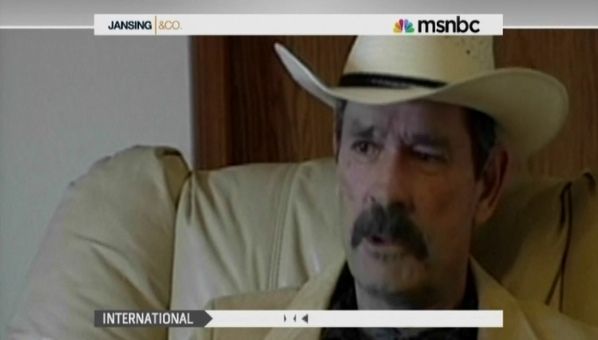Frazier Glenn Miller’s wife Marge was at home Sunday night when she got a phone call from The Southern Poverty Law Center. Yes, she told the Center, she’d spoken to her husband that morning. And yes, she said, law enforcement had shown up at her door that night. They told her that husband had been arrested for killing three people at two Jewish centers.
While booking records in Kansas reportedly identify Sunday’s shooting suspect as Frazier Glenn Cross of Aurora, Mo., the SPLC said that name was an alias for Miller. They would know. The SPLC, which tracks hate groups, has tangled with Miller for more than two decades, and has followed his career as a violent Ku Klux Klan and white supremacist extremist. The SPLC maintains a long background file on Miller on its website, and the information there has provided much of the background for early media reports about the shooting.
According to the SPLC, Miller was born in Springfield, Mo. in 1940, and dropped out of high school to join the Army. He spent 20 years on active duty, including 13 years as a Green Beret, and served two tours in Vietnam. His introduction to the white supremacist movement occurred in the early 1970s, when his father gave him a copy of the racist newspaper The Thunderbolt, published by the National States’ Rights Party. According to the SPLC, Miller’s Klan-related activities forced his retirement from the Army in 1979.
In 1980, while living in North Carolina, Miller formed the Carolina Knights of the Ku Klux Klan. He began to collect weapons, and conducted military training with help from active-duty soldiers. According to the SPLC, Miller was part of a new kind of Klan leader that emerged in the 1980s, preferring fatigues over traditional Klan robes. He began organizing regular rallies and marches. In 1983, Miller’s group focused its attention on a black prison guard who had filed a discrimination lawsuit against the North Carolina prison system. The group’s intimidation of the guard and other African Americans in North Carolina prompted the SPLC to sue Miller and the Carolina Knights in June 1984. What followed was years of legal twists and turns.
The lawsuit resulted in a settlement with Miller that prevented him and his group from operating as a paramilitary group and from harassing or threatening black people or white people who associated with black people. Miller responded by forming a new group, the White Patriot Party, in early 1985. And by the next year, Miller had been found guilty of criminal contempt for violating the settlement, and sentenced to a year in prison, with six months suspended. At his trial, one witness said Miller had amassed weapons and explosives — including anti-tank rockets — and was involved in plans to “create a paramilitary guerrilla unit for later use in establishing a White Southland.” While out on bond awaiting an appeal, Miller went underground.
When the FBI caught him in Springfield, Mo., he was with four other Klansmen in a mobile home where authorities found weapons, explosives, and $14,000 in cash. Miller and the others were indicted for “conspiracy to acquire stolen military weapons, explosives and equipment, and for planning robberies and the assassination” of SPLC founder Morris Dees, according to the center. In 1987, Miller pleaded guilty and served three years in federal prison. He also agreed to testify against 14 other leading white supremacist.
Since then, Miller has continued to dabble in electoral politics (over the years he has run for both state and federal office), he wrote an autobiography, and he has distributed racist literature. He has posted more than 12,000 times on an anti-Semitic online forum called Vanguard News Network. He has worked closely with the website’s founder, Alex Linder, and has given money to maintain the operation. And Miller has ties to another Vanguard News Network user who turned violent: Kevin Harpham, a neo-Nazi who pleaded guilty to trying to bomb a Martin Luther King Jr. Day parade in Spokane, Wash. in 2011. According to the SPLC, Miller and Harpham wrote to each other regularly during Harpham’s trial. Miller was convinced, the SPLC reports, that Harpham’s lawyers “deceitfully convinced him that he would be found guilty regardless of his innocence.”






